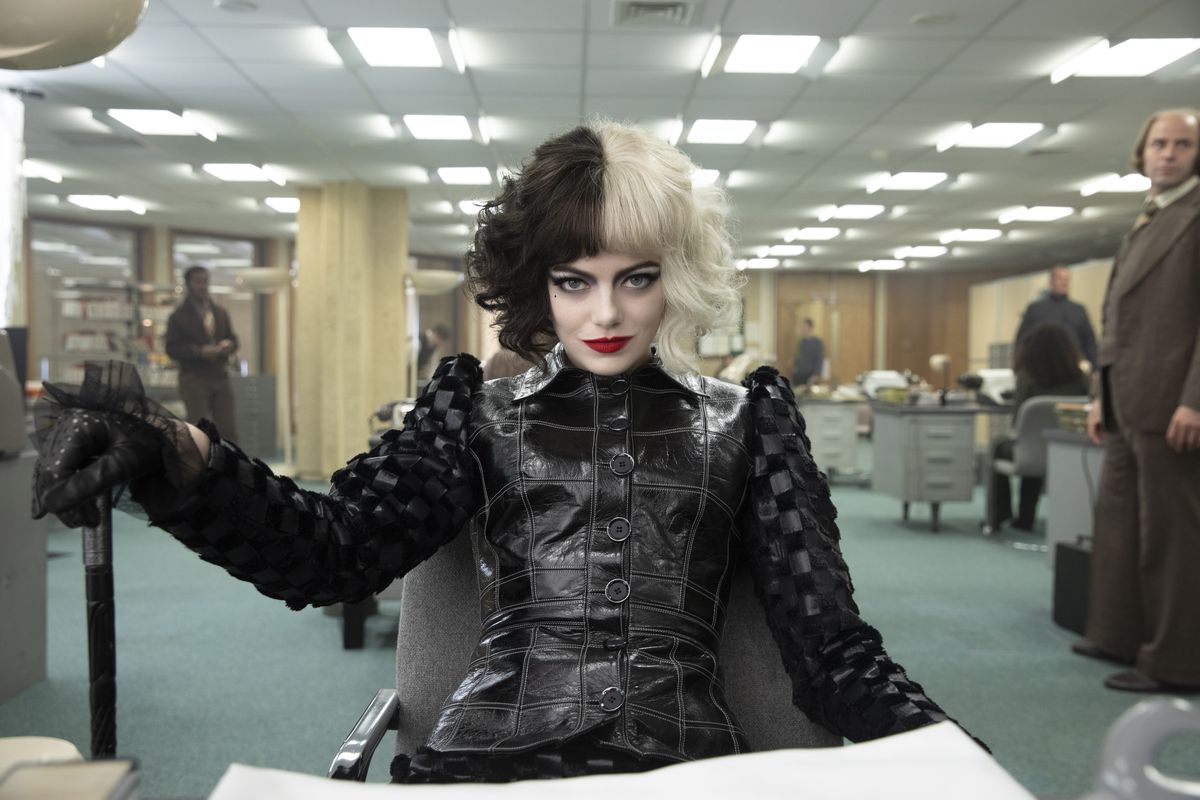For some viewers, Disney’s Cruella is our Once Upon a Time in Hollywood.
In both films—clocking in at a luxurious two-plus hours—the filmmakers have recreated period-specific worlds to their own specificities and idiosyncrasies. If those alternate versions of real life strike you, then you’re willing to luxuriate in every nuance and glimpse of them, regardless of running time or if the plot hums along in place for a spell. They’re real, but better than real. Reality made cinematic and fabulous.
Ah, there’s that word—I had promised my mother I would never use it. But then Cruella doesn’t have much use for mother figures, so perhaps that’s in keeping. Left orphaned by the abrupt death of her mother and then much disappointed in her eventual mother figure, the icily precise designer The Baroness, Cruella must fend for herself in London. She does that in true Disney fashion as one third of a gang of plucky thieves, first as children and then as adults. Cruella—oh, excuse me, birth name Estella—has a flair for fashion, something she was born with. As she herself points out in voiceover, it’s one thing to be born a genius… it’s quite another to raise one.
Or to be in one’s orbit, as both Estella and her compatriots discover for themselves. Estella’s first day working for The Baroness finds her nicked by the Baroness’ straight-edged razor. That she isn’t as equally slashed by The Baroness’ razor-sharp tongue says as much about her ambition as it does about The Baroness’ immediate recognition of her gifts.
This is of course Disney’s origin story for one of those Disney villains that some little boys spent more time obsessing over than the actual heroines, so Estella’s life is not a particularly rosy one. And the Dalmatians who pepper the film aren’t as roly-poly adorable as those hundred-plus that gave birth to this vicious, gleefully manic and anarchic movie. But what the film does as it cynically elaborates on existing IP is to cleverly use the vague outlines of a Disney movie (motherless girl, adopted family, eventual ascension to the throne) as a narrative trompe l’oeil. Look everyone: Here’s a movie about that lady with the crazy hair (but younger, so we can get that sweet TikTok demographic). Then, with a tug and a shrug, the movie transforms before our eyes like one of Cruella’s gowns. Now we have a movie about what it takes to nurture and protect one’s talent! Hey, here’s a movie about whether or not it’s possible to succeed without seeing others as obstacles. And here’s a movie about what it means to be a woman with a wardrobe.
That is not a flippant remark; that’s the crux of much of what makes this both a great film and a pleasurable one. Costume designer Jenny Beaven is a marvel. The costumes in Cruella are armor; disguise; weapon. Beavens’ clothes are both plot devices and commentary, not only on the characters’ motivations but on the character’s characters. The Baroness’ designs are an addled ‘70s take on Dior, exactly the sort of rigidly constructed garments that The Baroness would push as cutting edge. They look like what they are: structured suits meant to disguise one’s true self and project an indomitability that borders on performance art.
Estella and then Cruella’s designs are more daring, an outraged howl at how unfair the world is and a cri de coeur that demands to be heard. The orphaned girl who grew up in the shadows is tired of hiding, both her true rebellious nature and her two-toned hair. Who among us forced to tamp down one’s authentic self doesn’t identify with Cruella making a fool out of the gatekeepers and their enforcers?
And who among us can resist Emma Stone’s virtuoso performance, the kind of old Hollywood turn that is equal parts craft and personality? She’s having a ball going for broke, whether it’s driving a De Ville like a maniac or owning the runway during a guerilla fashion show to the strains of “I Wanna Be Your Dog.”
She’s matched (and perhaps a bit outdone) by Emma Thompson as The Baroness, a woman who flatly announces she sees everything but herself as an obstacle. As such, she can barely be bothered to acknowledge competitors, preferring to kill them than compete. By the time she is forced by circumstances and Cruella into raising an eyebrow, the break is as radical as if she’d started hurling pottery.
Those of us who fell for I, Tonya in 2017 should have been prepared for the pointed, barbed delights of Cruella, helmed as they both are by Craig J. Gillespie. He understands the power of female rage, the kind that sits on simmer for years only to finally erupt. And with the screenwriters Dana Fox and Tony McNamara (and story by Aline Brosh McKenna, Kelly Marcel, and Steve Zissis), Gillespie creates a simulation of a specific era where a lot of culture wars—generational, gendered—came to a head.
To say that Cruella is an instant gay classic is true, but it’s also a diminishment. Cruella is a great film, one that only feels like a Disney product in momentary flashes of slapstick or broad performances (looking at you, Paul Walter Hauser). Or maybe it’s only a great film for those of us who relish a movie about living by one’s wits and wit, along with a healthy dose of pyromania. That Hollywood doesn’t see the enormous market for those movies is their loss. Until then, we have our new hero, one who’s brilliant, bad, and a little bit mad. In other words, the perfect woman to usher us into a newly reopened world, where at least two generations are determined to strike down the infrastructures zealously guarded by those no longer in fashion. As Florence + the Machine sing in their song “Call Me Cruella,” “You’re stuck in the past, and I’m ahead of the game.”
Sorry baby boomer—it’s Cruella’s world now. You’re just living in it.




